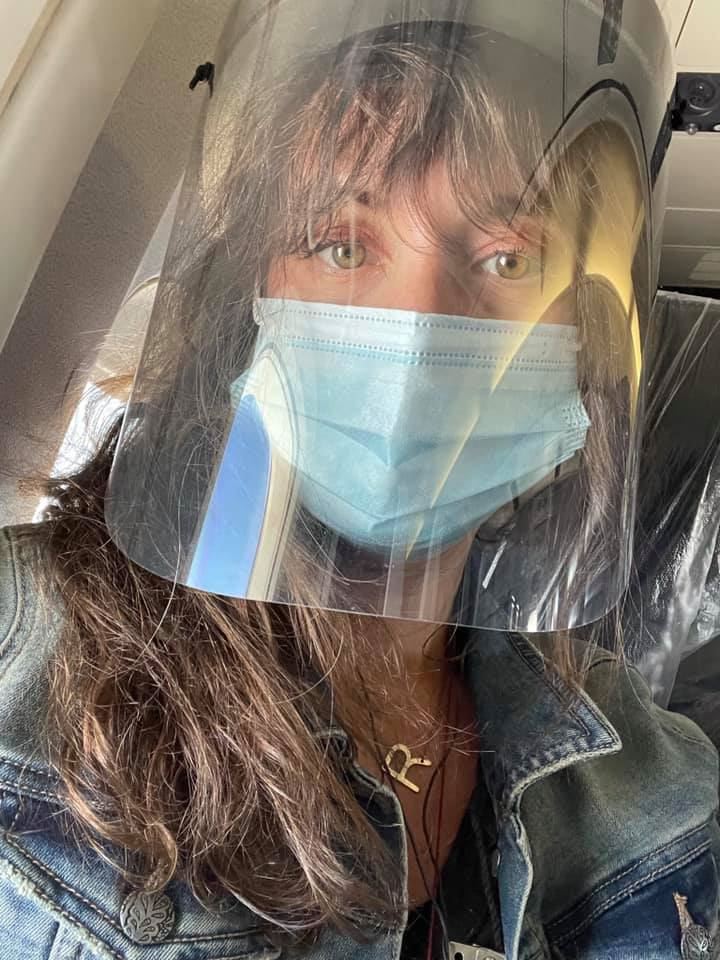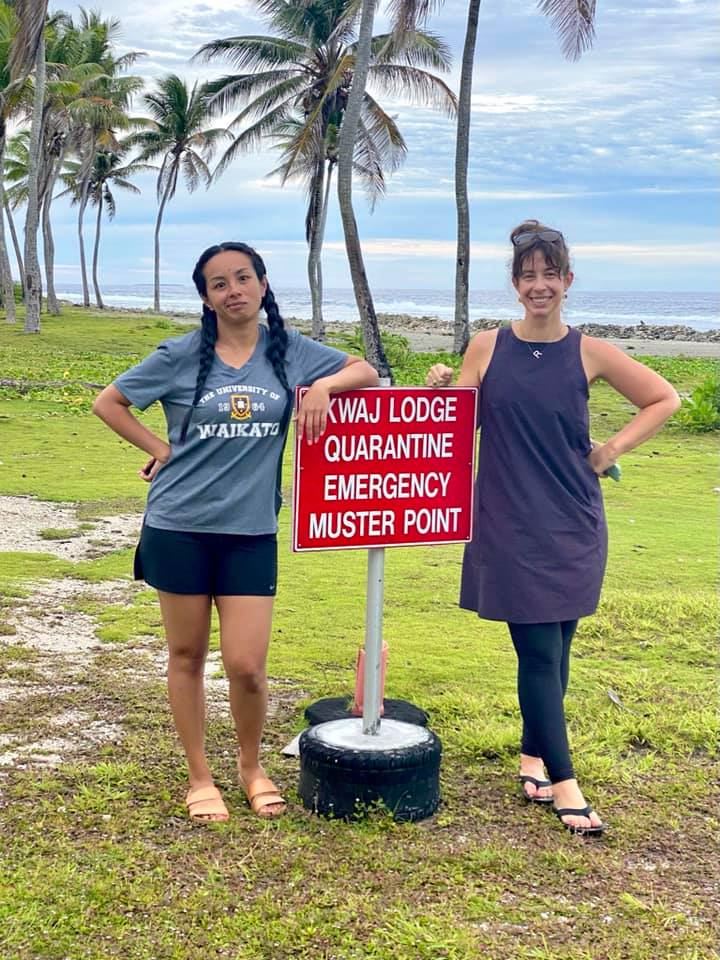
Virginia TESOL practitioners now span the globe. Rebecca Raab shares about her recent journey to accepting a teacher educator position at the College of the Marshall Islands. Rebecca served as the president of Virginia TESOL from 2018-2020. She currently serves in the role of past president and nominating chair.
Tell us a little bit about your background and how you ended up in the TESOL field:
I was an anthropology major in undergrad and was bitten by the travel bug very early in life, so I’ve always been fascinated by different cultures and languages. However, I didn’t feel a strong pull to complete an advanced degree in anthropology. About 6 months after graduating, several of my friends left to teach in Japan. This got me thinking about teaching English internationally. My mother, a former K-12 English teacher, advised me to get a teaching license as it would be a credential I could always use. Thus, I began a master’s program at Virginia Tech in ESL with every intention of teaching abroad. Student teaching at Patrick Henry High School in Roanoke, Virginia, however, made me fall in love with teaching multilingual learners in US K-12 settings, and I decided to teach in the US for several years, thinking that eventually I would go abroad. My career and life then took some interesting turns, with TESOL being the constant. I’ve taught K-12 multilingual learners in VA and NC, and I was the Director of Writing Support and ESL programs at Averett University. I completed my PhD at Virginia Tech in Curriculum and Instruction studying the experiences and supports of new ESL and bilingual education teachers in 2020.
What led you to accepting your new position in the Marshall Islands?
When I was close to finishing my PhD, I entered the wild west of the higher education job market. I applied to schools all over the US and abroad. However, I vividly remember the April 2020 afternoon when I saw the job posting for the College of the Marshall Islands (CMI) on HigherEdJobs. I just knew I had to apply, and I felt that it was where I needed to be - I felt physically pulled to apply. The pandemic, however, made things challenging. I was interviewed in July of 2020, but due to the pandemic, CMI could not move ahead as the Republic of the Marshall Islands (RMI) had closed its borders (and they are still closed as of July 2021). I was disappointed, but still determined to go abroad. Luckily, I had the opportunity to teach at Radford University as a 1-year full-time temporary hire for the 2020-2021 academic year, and I spent the fall of 2020 researching other opportunities internationally. Then on January 13, 2021, exactly 6 months after my last contact with CMI, they emailed me asking if I was still interested in the position. Yes--yes I was!
What will your job look like?
We are finalizing my schedule in the next week or two, so I’m not 100% sure of what courses I’ll be teaching. However, CMI is a community college that has an associates and bachelors degree program in elementary education, so I will be teaching courses across the elementary education department. I’m really excited because it looks like I’ll have a number of practicum students which means I’ll be spending quite a bit of time in the local schools observing future teachers learning to teach! This is a great video about CMI and some Marshallese history.
Tell us more about the Marshall Islands - a country that many readers may have never heard of. What have you learned or experienced there so far?
To learn more about the Marshall Islands, Google them! I didn’t know much at all, but the US used several of the atolls during the nuclear arms race in the 1940s-60s as a testing ground. Many were forced to leave their homes and can never return due to nuclear contamination. Because of this, the US government provides aid to the RMI, and RMI citizens can travel, work, and live in the US. Much of the population lives in Majuro, the capital, and Ebeye is another larger population center.
To learn more about the Marshall Islands, I recommend reading Peter Rudiak-Gould’s Surviving Paradise: One Year on a Disappearing Island. Plus, I’ve enjoy reading their local newspaper and browsing the Marshall Islands Guide website.

Any adventures yet?
No super fun adventures yet as I am still in quarantine. I guess the adventure has been getting here. Due to the Covid-19 border closures, my departure date kept changing. I thought for a while I was leaving in April and then May. Then, on June 16 I received an email asking if I could possibly be in Honolulu on June 18 as I had snagged a seat on a repatriation flight. The repatriation flights are reserved for RMI citizens who have been stranded due to the pandemic. I was very lucky to get a spot. So, I packed in a hurry and began the adventure with less than 48 hours notice (the fun thing is, I’d been pretty much packed since April, so it didn’t take long).

The RMI government requires a 28-day quarantine to enter the country. I entered my first 14-day quarantine on June 20th, 2021 in Honolulu along with 38 Marshallese repats. On June 5th, we flew to Kwajalein, an atoll in the RMI where the US military has a base. In Kwajalein, we entered into our second 14-day quarantine. As I am writing this, I just had my last COVID-19 test, and hopefully will be able to leave quarantine tomorrow and fly to Majuro, the atoll I will be living on for the next three years.
So far I have witnessed breathtaking sunrises and beautiful blue water. I’ve made two friends, my roommate, who is returning from New Zealand where she completed her master’s degree, and the lab technician who runs all our COVID tests (he is friends with my roommate and lives on Ebeye, which is an island across from Kwajalein). He is an excellent photographer, and if you have Instagram, I suggest following him (@michaelove692 and @ebeyeislandhome). I’ve also watched hours of the Armed Forces Network Kwajalein broadcasts as our television network is the US military base TV (this is a first for me).

How has your career in TESOL prepared you for this new position?
I truly believe everything has led me to this point. My years in K-12 schools in NC and VA. Teaching at Averett University, Virginia Tech, and Radford. All my travels around the world. I would not be here had I not had all my past experiences. Additionally, serving on the VATESOL board has prepared me for taking on new challenges. I never thought in 2008 when I attended my first VATESOL conference that I would be VATESOL president one day. And when I started teaching in 2009, I never thought I’d be teaching future teachers in the middle of the Pacific Ocean in 2021...but here I am, and I am so excited and grateful for the opportunity.
Do you have any professional or personal goals for your time in the Marshall Islands?
I would love to learn Marshallese (i.e. Kajin Majel), and I intend to take several courses on Kajin Majel and Mantin Majel (Marshallese culture) at CMI. I also want to learn as much as I can about their schools and help future teachers become the best teachers they can be. And...island hopping around Micronesia is on the agenda, but with Covid, who knows when that will happen. For now, I’m simply excited to leave my 28-day quarantine behind, take a walk, swim, and go outside whenever I want.

What else would you share with our VATESOL readers?
Believe that the impossible is possible. You never know where your life will take you! And, my 28-day quarantine has actually been incredibly relaxing and peaceful (this has been a lovely surprise). Again, the impossible is possible.
Feel free to follow me on Instagram @rebeccaraineraab, Facebook (Rebecca Raab) or email me rebecca.raine@gmail.com. And if you ever want to visit, please let me know!
